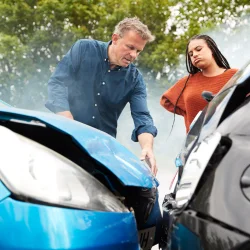If you have been in a car accident, you may have to pay for your medical bills even if the other driver caused the accident. However, if the other driver is found to be at fault, you can claim them to recover compensation for medical expenses and other damages in a personal injury lawsuit.
As an experienced personal injury attorney, I'll help you unravel the intricacies of insurance policies, state laws, and fault determination to understand better who's responsible for paying medical bills.
Quick Summary
- Medical bills after car accidents depend on insurance policies, state laws, and the determination of fault.
- Depending on individual circumstances, these medical bills can be paid through health insurance, auto insurance, or uninsured motorist coverage.
- If you have an accident, you may need to pay for different medical costs, such as going to the hospital, getting tests done, having surgery, taking medicine, and getting help from medical providers.
Who Pays My Medical Bills After An Accident?

However, once the no-fault coverage is exhausted, health insurance companies step in to pay for medical expenses related to the auto accident. Suppose you've been in a car accident: in that case, it's recommended to seek the assistance of a knowledgeable lawyer who can explain how medical bills are covered and make sure you are aware of your legal entitlements and choices regarding medical expenses.
How Are Medical Bills Paid?

Reviewing your auto insurance policy declaration pages to understand whether your medical benefits are "primary" or "coordinated" is important. "Primary" means your auto insurance will pay your medical bills, while "coordinated" indicates that your health insurer will cover them.
Health Insurance Policy Limits
Health insurance policy limits can impact how much your medical bills are covered after a car accident [2]. These limits vary depending on your insurance provider, but generally, medical bills are charged up to the policy limits before health insurance comes into play.
Personal Auto Insurance Policy
Personal auto insurance policies can help cover medical expenses and lost wages for you and your passengers after a car accident, regardless of who was at fault. This coverage is optional and not available in all states.
Uninsured Motorist Coverage

Med Pay
Med Pay, or medical payments coverage, is an optional form of financial compensation that covers medical expenses regardless of who is at fault in a car accident. It applies to both the policyholder and their passengers.
Medical Liens
Medical liens enable hospitals to recover expenses from verdicts or settlements for accident victims with inadequate insurance coverage. The medical institution can be reimbursed for its costs from any verdict or settlement reached in a personal injury lawsuit by holding a lien.
Personal Injury Protection (PIP)

In no-fault states, PIP coverage is utilized to pay for these expenses, regardless of who is liable for the accident. PIP insurance can offer financial relief for accident victims, helping cover medical care costs and lost wages after a car accident.
What Kinds Of Medical Expenses Could Occur After A Car Crash?

"When another driver negligently causes a car accident that injures you, you can seek compensation for your medical bills and other losses by filing a claim with their insurer."
- Frank Fernandez, Personal Injury Attorney at The Fernandez Firm
FAQs
1. Can you file a personal injury claim against the at-fault driver following an accident?
You can file a personal injury claim against the at-fault driver following an accident in at-fault states or when serious injuries occur in no-fault states. In no-fault states, the criteria for filing a personal injury claim include a certain amount of medical bills, lost wages, and pain and suffering.
2. How are medical bills paid in a no-fault state?
In no-fault states, medical bills are paid through the victim's insurance policy, regardless of who caused the accident. This means that each driver's insurance covers their medical expenses and lost wages up to the policy's limit, regardless of who caused the accident.
3. When will a car insurance company pay for medical care after a car crash?
A car insurance company will pay for medical care after a car crash based on the policy terms and the fault determination. If the policy includes medical payments coverage, the auto insurance company will offer financial assistance for medical care after a car crash.
Schedule a Free Case Evaluation with a Car Accident Lawyer Today
Suppose you're facing medical expenses after a car accident. To better understand your options for seeking compensation, consider scheduling a free case evaluation with an experienced car accident lawyer who can educate you on your rights.
At Schmidt & Clark, LLP, our car accident lawyers guide you on filing a car accident claim with insurance companies, navigating the complexities of no-fault and at-fault states, and exploring potential legal remedies. Schedule a free lawsuit evaluation at Schmidt & Clark, LLP today.
References:
- https://www.dfs.ny.gov/consumers/auto_insurance/minimum_auto_insurance_requirements
- https://www.healthcare.gov/why-coverage-is-important/protection-from-high-medical-costs/
- https://www.tdi.texas.gov/tips/uninsured-motorist-coverage.html

 Published by
Published by